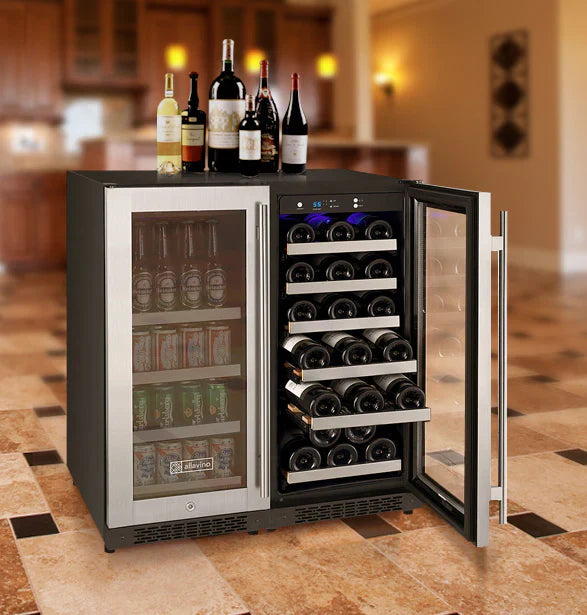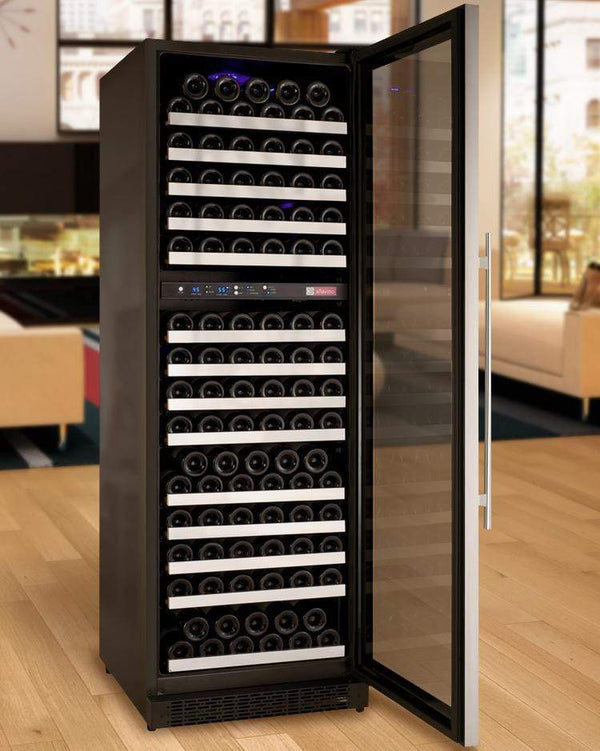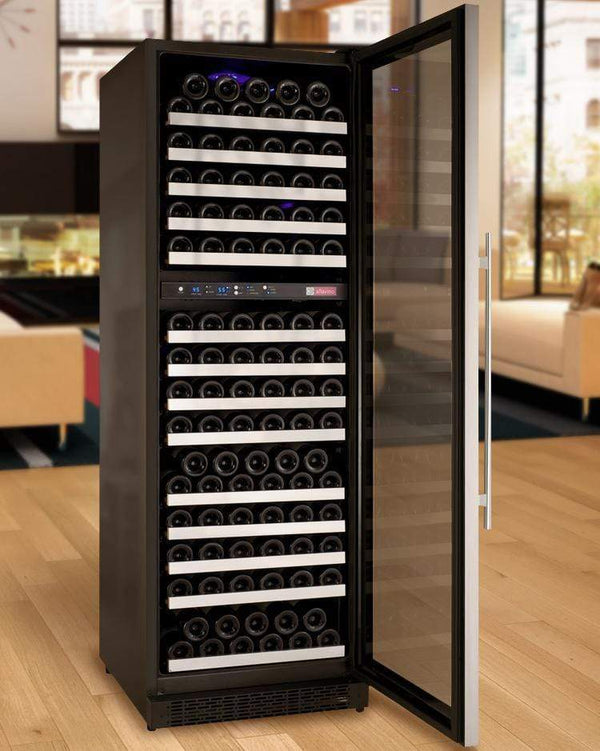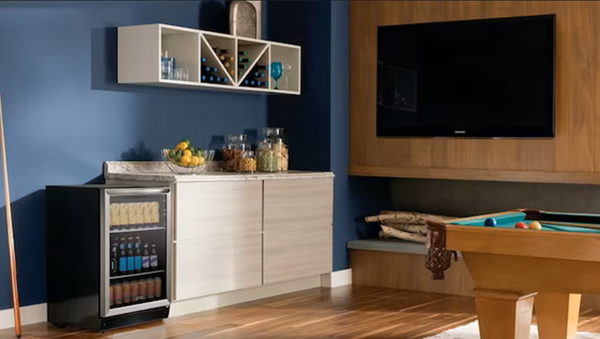The Benefits of Decanting Wine Explained | Expert Guide
Unlocking the Secrets of Decanting Wine
By Jim Hopper, Wine Cooling Expert
Decanting wine is an age-old ritual that transforms the drinking experience, yet it often seems shrouded in mystery. Is it necessary? What does it actually do? The truth is, decanting can make a good wine great—if you know how and when to do it.
If you’re looking to master every aspect of wine enjoyment, from proper storage to ideal serving temperatures, be sure to check out our Wine Cooling and Serving Guide for expert tips.
If you’re just starting to build your wine collection, don’t miss our beginner-friendly guide to the Best Wine Cellar Cooling Unit for Beginners to keep your bottles in top condition.
Key Benefits of Decanting Wine

-
Aeration: Unlocking Aromas and Flavors
Pouring wine into a decanter exposes it to air. This process, called aeration, softens harsh tannins, releases complex aromas, and allows flavors to develop. Young red wines especially benefit, becoming smoother and more expressive. -
Sediment Removal: Ensuring Clarity and Texture
Mature wines often develop sediment, which can make the wine taste gritty or bitter. Decanting separates this sediment, ensuring a clear, enjoyable pour. -
Reviving Older Wines
Older wines can sometimes smell musty or “closed” right after opening. A gentle decant can help these wines shed off-aromas and reveal their best character. If a cork breaks or crumbles, pour the wine through a fine mesh strainer or a piece of cheesecloth into the decanter to catch even the smallest cork fragments. For stubborn cases, you can use a funnel with a built-in screen or filter the wine twice if needed. These tools help ensure a smooth, particle-free pour, even when the cork is particularly fragile. -
Rescuing Wines with Broken Corks
If a cork breaks or crumbles, decanting through a fine mesh strainer keeps cork particles out of your glass. -
Adjusting Serving Temperature
Decanting can help gently warm over-chilled wines, especially whites, bringing them to their ideal serving temperature.
Decanting can help gently warm over-chilled wines, especially whites, bringing them to their ideal serving temperature. For a detailed guide on serving wine at its best, read What is the Correct Temperature When Serving Wine?
Which Wines Benefit from Decanting?
-
Young Red Wines:
These often have strong tannins and tightly wound flavors. Decanting helps soften their edges and brings out fruit notes. -
Mature Red Wines:
Decanting removes sediment and can gently revive subtle aromas. -
White and Rosé Wines:
While usually served straight from the bottle, some fuller-bodied or aged whites (like Chardonnay) can benefit from brief decanting, especially if they taste “tight” or muted. -
Sparkling Wines:
Rarely decanted, except for certain small-production Champagnes that show “reductive” aromas (like burnt match). Most sparkling wines should be served straight from the bottle to preserve their bubbles.
If you want to ensure your sparkling wines are served perfectly, check out our advice on What is the Best Temperature for Champagne.
Special Considerations for White, Rosé, and Sparkling Wines

Most white and rosé wines do not need decanting, but there are exceptions. If a wine smells of struck match, burnt rubber, or seems muted (a sign of “reduction”), decanting for 15–20 minutes can help these aromas dissipate and allow fruit notes to emerge.
For sparkling wines, decanting is rarely recommended, as it can reduce bubbles and freshness. However, certain small-production Champagnes may benefit if they show strong reductive aromas. In these rare cases, use a decanter with a narrow neck or amphora shape to help preserve effervescence.
How to Decant: Step-by-Step
For Young Wines (Especially Reds)
- Choose Your Vessel: You don’t need a fancy decanter—a large glass pitcher works just fine.
- Pour with Vigor: Pour the wine into the decanter so it splashes, maximizing contact with air.
- Let It Breathe: Allow the wine to rest in the decanter. Taste every 30 minutes to track its evolution. Young, tannic reds may need up to 1–2 hours for full effect.
- Optional: Use an aerating funnel to boost air incorporation during pouring.
For Mature Wines (10+ Years)
- Stand the Bottle Upright: Let it sit for at least 24 hours, so sediment settles at the bottom.
- Open Carefully: Remove the cork gently. Wipe the inside and outside of the neck with a clean cloth.
- Pour Slowly: In a well-lit room, pour the wine in a slow, steady stream into a decanter (or pitcher) fitted with a fine mesh strainer or funnel. Watch for sediment approaching the neck and stop pouring as soon as it appears.
- Minimal Aeration: Older wines are delicate—15–30 minutes in the decanter is usually enough.
For White and Rosé Wines
- Decant Only if Needed: If the wine tastes muted or smells of struck match, decant for 15–20 minutes to open it up.
- Adjust Temperature: If served too cold, decanting can help bring the wine to its ideal drinking temperature.
Quick Reference: Decanting Times
| Wine Type | Decanting Time | Purpose |
|---|---|---|
| Light-bodied reds | 20–30 minutes | Open delicate fruit and floral notes |
| Medium-bodied reds | 30–60 minutes | Soften tannins, enhance aromas |
| Full-bodied reds | 1–2 hours | Soften dense tannins, reveal complexity |
| Mature reds (10+ yrs) | 15–30 minutes | Remove sediment, gentle aeration |
| White/Rosé (if needed) | 15–20 minutes | Open up muted aromas, adjust temperature |
| Sparkling wines | Rare, 15–20 minutes | Only for certain Champagnes with reduction characteristics |
Aeration vs. Oxidation: Why Timing Matters
Aeration brings wine to life, unlocking hidden aromas and flavors. However, too much air (oxidation) can make wine taste flat or tired. That’s why timing is crucial—taste as you go, and don’t leave wine in a decanter for hours on end, especially with older bottles.
Tools and Tips for Decanting

- Decanter or Pitcher: Any clean, clear vessel will work.
- Aerating Funnel: Increases air exposure during pouring.
- Fine Mesh Strainer: Catches sediment or cork fragments.
- Light Source: Shine a light under the bottle neck to spot sediment as you pour.
- Double Decanting: For removing sediment and returning wine to its original bottle for serving—useful for formal occasions.
For natural, orange, or biodynamic wines, decanting can help resolve reduction or other off-aromas. Try 15–30 minutes of aeration and taste as you go.
If you need rapid results, instant aeration devices can mimic the effects of decanting in seconds—handy for wines that need quick improvement or when you’re short on time.
Double Decanting: An Advanced Technique
For formal occasions or when you want to serve wine from its original bottle after removing sediment, double decanting is a helpful method. Here’s how it works:
- Decant the wine into a clean decanter to separate sediment and allow brief aeration.
- Rinse the original bottle to remove any residue or cork fragments.
- Carefully pour the wine back into the original bottle using a funnel. This technique is especially useful for events where presentation matters or when serving multiple bottles side by side. It also allows you to compare the wine’s character before and after aeration.
Common Myths About Decanting
-
“Only expensive or old wines need decanting.”
False. Many affordable, young wines benefit from aeration. -
“All wines should be decanted.”
Not true. Most rosés and sparkling wines are best straight from the bottle. -
“Decanting ruins delicate wines.”
When done gently and for a short time, decanting can actually help delicate wines shine.
Final Thoughts

Decanting is both an art and a science. Whether you’re enjoying a young, bold red or an aged classic, the right decanting approach can elevate your wine experience. Don’t be intimidated—experiment, taste as you go, and discover how a little air can make a world of difference in your glass.
Thinking about expanding your wine collection? Discover the advantages of buying in bulk with our article on Why Buy Loads of the Same Bottle of Wine?
📚 Frequently Asked Questions (FAQs)
What are the benefits of decanting wine?
Is it always good to decant wine?
What is the purpose of a decant?
How to tell if wine needs decanting?
What happens if you don't decant wine?

Designing or Upgrading a Wine Cellar?
We got you! Here at Wine Coolers Empire, we will guide you in building your dream wine cellar.











